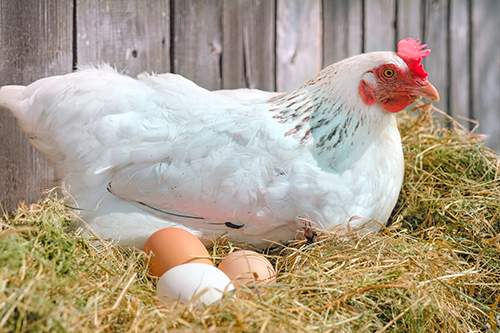Collecting and Storing Fresh Eggs
Feb 14, 2022

Chick season is almost here! The first day that your chicks begin producing is a rewarding experience. Multiple studies have proven that farm-fresh eggs hold more nutritional value than store-bought eggs and contain less cholesterol and saturated fat. Plus, they just taste better!
To ensure that your family can safely enjoy this bounty, follow these tips for cleaning and storing your flock’s eggs:
Keep a clean coop
Keeping your hens’ eggs as clean as possible begins with how well you set up your coop and keep it clean. Since hens often defecate in their roosting area at night, you will want to keep your hen’s nesting area separate from their roosting area. Position their nesting area away from the coop entrance to prevent dirt and debris from outside the coop from contacting the eggs. Diligently refresh the bedding in your hens’ nesting boxes every day and remove any dirty straw to prevent bacteria from building up.
Clean your eggs
Even with the best sanitation practices, you are still likely to come across a lot of dirty eggs. Wiping them with a dry paper towel will often do the trick, but if the eggs have chicken poop on them, it may be necessary to rinse them. Use warm water when washing your eggs — the warm temperature causes the egg’s contents to expand against the shell, which prevents bacteria from entering. However, keep in mind that washing an egg will remove some or all of its bloom, which is the protective coating that prevents bacteria from entering. By removing the bloom, your egg will not stay fresh for very long.
Store your eggs
Eggs that have their bloom intact can be safely left on your counter for a couple of weeks or refrigerated for up to two months. However, if you’ve removed their bloom by rinsing them, store them in your refrigerator and use them within three days. Keep track of which eggs are newest so that you can use the old ones first. If you accidentally lose track of the eggs, here’s a simple trick — place the eggs in a bowl of cold water. If they sink to the bottom, they’re very fresh, and if they stand on one end at the bottom of the bowl, they are likely a few weeks old but are still safe to eat. If any eggs float to the top, however, they are spoiled and should be thrown away.
Your local Co-op is likely preparing for their first shipment of chicks any day now. Until then, make sure to stop by for all your chick supplies such as heaters, feeders, waterers, and feed to get ahead of the game!
For more content like this, check out the latest issue of the Cooperator.
To ensure that your family can safely enjoy this bounty, follow these tips for cleaning and storing your flock’s eggs:
Keep a clean coop
Keeping your hens’ eggs as clean as possible begins with how well you set up your coop and keep it clean. Since hens often defecate in their roosting area at night, you will want to keep your hen’s nesting area separate from their roosting area. Position their nesting area away from the coop entrance to prevent dirt and debris from outside the coop from contacting the eggs. Diligently refresh the bedding in your hens’ nesting boxes every day and remove any dirty straw to prevent bacteria from building up.
Clean your eggs
Even with the best sanitation practices, you are still likely to come across a lot of dirty eggs. Wiping them with a dry paper towel will often do the trick, but if the eggs have chicken poop on them, it may be necessary to rinse them. Use warm water when washing your eggs — the warm temperature causes the egg’s contents to expand against the shell, which prevents bacteria from entering. However, keep in mind that washing an egg will remove some or all of its bloom, which is the protective coating that prevents bacteria from entering. By removing the bloom, your egg will not stay fresh for very long.
Store your eggs
Eggs that have their bloom intact can be safely left on your counter for a couple of weeks or refrigerated for up to two months. However, if you’ve removed their bloom by rinsing them, store them in your refrigerator and use them within three days. Keep track of which eggs are newest so that you can use the old ones first. If you accidentally lose track of the eggs, here’s a simple trick — place the eggs in a bowl of cold water. If they sink to the bottom, they’re very fresh, and if they stand on one end at the bottom of the bowl, they are likely a few weeks old but are still safe to eat. If any eggs float to the top, however, they are spoiled and should be thrown away.
Your local Co-op is likely preparing for their first shipment of chicks any day now. Until then, make sure to stop by for all your chick supplies such as heaters, feeders, waterers, and feed to get ahead of the game!
For more content like this, check out the latest issue of the Cooperator.